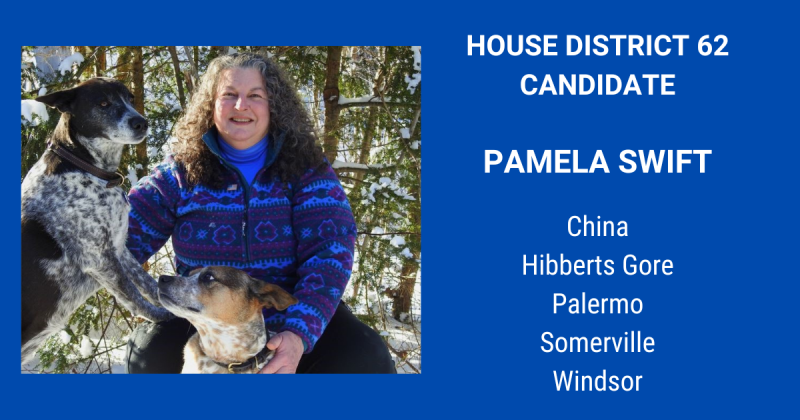On the issues: House District 62 candidate Pamela Swift
Penobscot Bay Pilot has posed questions to each candidate running for Maine State Legislature, providing the opportunity for the public to better understand their position on issues important to the state. Candidates responding with their individual written answers will have their responses stored in the Pilot’s 2022 Election Resource Guide.
Pamela Swift, a member of the Democratic Party, is seeking election to represent Maine House District 62, which includes Waldo County’s Palermo, the Lincoln County communities of Hibberts Gore and Somerville, as well as the Kennebec County municipalities of China and Windsor. She is running against Katrina Smith and Lindsey Harwath; access Smith’s questionnaire here.
Please provide a concise biography of yourself, and state why you are running for political office.
Concise biography: Pam Swift, MD, a longtime Palermo resident, has deep family roots in Maine, tracing three previous generations to Bangor, Bucksport, and Stockton Springs.
Swift earned a bachelor’s degree in animal science with the intention of becoming a veterinarian, but later decided to pursue a medical degree. After graduating from medical school and completing her residency in obstetrics and gynecology, Swift joined a large practice that specialized in high-risk obstetrical cases, where she worked her way up to full business partner. After 23 years practicing medicine, Swift returned to her animal science roots and purchased a farm in Palermo with her husband, Don, where they raise grass-fed sheep, free-range organic laying hens, and acorn-fattened pigs.
Pam has been civically engaged in her community serving as Secretary on the Board of Trustees for the Palermo Community Library, Secretary for the Branch Mills Grange, #336, Chair of the Palermo Days Committee, and member of the Palermo Historical Society. She is also currently serving her second term on the Select Board of Palermo.
Why I’m running for political office: In 2015, I had an epiphany and realized if I’m not willing to stand up and serve in a political office, then we get what we get. That’s when I decided to run for Select Board member in Palermo. I’m now serving my second term in that office. Then, when we were redistricted after the 2020 Census and I learned no Democrats were running in our new District 62, but two Republicans were — I couldn’t let that go unchallenged.
What are the three most pressing issues facing Maine, as a state, today, and how would you like to see them resolved?
One of the top three issues facing Maine today is access to affordable healthcare. I am a big proponent of universal healthcare. Without adequate healthcare, none of us can be our best, most productive selves. My vision of healthcare also includes dental and hearing care, lowering the cost of prescription medications, the prevention and treatment of opioid addiction, and protecting reproductive rights.
Another major issue for Maine is climate change. Our state’s average temperatures have already increased and this has created observable real-world concerns. On our farm, due to drought, there have been years where I’ve had to start feeding our sheep hay in August instead of December because the grass didn’t grow back after the first round of grazing. This dramatically increases the cost of production. Also, milder winters mean more ticks in the spring and fall resulting in a higher risk of contracting tick-borne diseases — not just for people, but for horses, cattle, and dogs as well. And Brown-tailed moths, the new scourge, are negatively impacting both quality of life and businesses — especially those involving tourism.
PFAS contamination is the third major issue affecting Maine and our understanding of the problem is only in its infancy. Maine is already a leader in the nation in addressing this problem head-on. Decades ago, farmers were encouraged to spread sludge and septage on their fields as “free fertilizer.” Now, as these forever chemicals have leached into the groundwater, contaminating people’s wells, their devastating health effects have become evident. The State has launched a massive testing effort and is providing filtration systems for resident’s whose wells have been contaminated. My understanding is that the State is also offering to purchase contaminated farm land to provide relief for farmers whose livelihood has been destroyed. It is obvious, however, that we need to find a long-term solution to this problem, and the corporations responsible for the contamination need to be held accountable.
Maine is grappling with a housing shortage, and legislation has been crafted — and passed last year — at the Maine Legislature to try and ease the situation by allowing greater density in all municipalities. Those municipalities now are analyzing this new state rule to understand how it applies to local zoning ordinances. Do you think this was an appropriate law to pass?
I do think this was an appropriate law to pass. Currently, Maine is short approximately 19,000 affordable housing units. The new law loosens zoning laws to allow two units on plots zoned for single-family use in residential areas. It gives property owners the right to build up to four units on their land. This law also guarantees homeowners the right to build “granny flats” and in-law-suites. These measures will go a long way to help alleviate the housing crisis.
Do you have other ideas, and proposals, to help ease the housing problem?
I would love to see the old brick factory buildings along Maine’s rivers come back to life. These could be retrofitted with apartments and condominiums interspersed with commercial businesses like grocery stores, pharmacies, clothing stores, art galleries, and restaurants. Mixing residential and commercial would obviate the need for residents to have transportation and would possibly provide job opportunities as well. This model would help revitalize the factory towns in Maine.
Another model I’ve seen used in recreational skiing areas that makes it possible for the labor force to live in the town in which they work is to sell housing at a reduced, affordable rate with the understanding that in the future the homes can only be sold at that same reduced rate.
What legislative committees would you like to serve on and why?
I would like to work on the Agriculture, Conservation, and Forestry Committee and the Health Coverage, Insurance, and Financial Services Committee. With my training, education, and life experience, I can offer a knowledgeable voice to the issues these committees face.
Maine’s economy relies on small and micro-businesses. How will you help the entrepreneur succeed in this state?
Microfinance has proven to be a boon in helping small businesses get off the ground in developing countries — especially for women-led small businesses. The same strategy could be deployed to help small businesses in Maine. Microfinance allows borrowers to take out reasonable business loans safely. If the loan is coupled with education about business and finance, the chances of success increase for that business. The other major factor that would help small businesses thrive, is the availability of affordable, reliable childcare.
What are the greatest economic, cultural and social strengths in your district, and how will you support them?
My district’s greatest strengths are the beauty of its natural resources and the kindness of its people. It is a very rural area with rolling hills of forest and fields. The valleys are home to pristine rivers and sparkling lakes. People move here and stay here because they are drawn to the beauty of the land. When my husband and I moved her 10 ½ years ago, the thing that struck us most was how welcoming and accepting our new neighbors were. This profound neighborliness translates into a strong ethic of volunteerism. We have wide-ranging skillsets that can be tapped for the betterment of all.
What are the greatest problems in your district, and how do you intend to address them?
The pandemic made clear what the weak points in our district are. One is childcare. Women cannot participate in the workforce if they are unable to find adequate, affordable childcare. If childcare costs nearly as much as a woman earns, it makes little sense to enter the workforce. I’m pleased that the Governor’s Maine Jobs & Recovery Plan passed to help expand, renovate, and build new childcare facilities.
The next issue the pandemic exposed is the need for broadband internet for all of our residents. High-speed internet’s top benefit is greater opportunities for economic development. Reliable high-speed internet access helps attract and keep young families and businesses in the area, which is crucial for sustaining rural Maine communities. Our town, along with four others, have banded together to form a Broadband Utility District to build out a municipally-owned fiber-optic network — thanks to the hard work of our highly skilled volunteer pool.
Do you support construction of the 145-mile Central Maine Power transmission line from Quebec to Massachusetts?
I’m not in favor of the proposed transmission line from Quebec to Massachusetts. While I support clean hydro-power, my understanding is that the Quebec facility will not be creating an increase capacity of energy generation, they’ve simply found that Massachusetts will pay more for the electricity they already produce. Further, it’s my understanding that the company may need to resort to greenhouse gas producing sources to meet the increased demand. I also don’t support clearcutting a swath through the wilderness of the North Woods.
The Maine Commission on Indigent Legal Services recently received funding from lawmakers to fund five public defenders to travel the state representing indigent defendants. Its executive director says that is “not a solution, it’s a patch" and that the agency needs an estimated $51 million to open public defender offices in all 16 counties. Should the legislature be looking to fund more public defenders?
A. Until recently, Maine was the only state in the Union with no public defenders; now there are five who are tasked with serving the indigent in all of Maine’s 16 counties. Clearly this is not a sustainable model for the long run. The newly minted Maine Commission on Indigent Legal Services will need to be expanded to provide a rural public defender unit in each county. This will cost money, but we must make it happen because it is the Sixth Amendment right of every person to have legal representation under the law even if they’re indigent.
At least four county jails in Maine have combined to record nearly 1,000 phone calls between jailed defendants and their attorneys. What action would you like to see the legislature and governor take to ensure this never again happens?
This is not acceptable. Attorney-client privilege is one of the bedrocks of our justice system. Maine’s jail system needs to strictly limit employee access to recordings, make sure that all attorney phone numbers are blocked from the recording system, and anyone accessing attorney-client calls need to be held fully accountable to the law.
Maine is one of 16 states that does not offer parole after abolishing it in 1976. Should the state reinstate the possibility of parole?
Yes, Maine should reinstate the possibility of parole, but this opportunity should not be granted to all prisoners — only to those deemed not to be a threat to society. Prisoners should be able to make their case before a parole board to demonstrate what they’ve accomplished (such as furthering their education) during their time in prison. They would need to prove they have plans to contribute to society. The opportunity for parole would provide an incentive for prisoners to better themselves and would ultimately reduce the rate of recidivism. I believe in giving people a second chance.
There is a statewide shortage of nurses willing to work at nursing homes and assisted living facilities. What more should the state be doing to attract workers?
Thankfully, the 2015 report by Maine’s Nursing Action Coalition that predicted a 3,200 shortfall in in registered nurses by 2025 was taken seriously and measures were taken to close that gap. Nursing leaders, hospitals, and nursing education programs came together to expand student capacity in support of training to increase the number of graduates. In 2021, Maine had a shortfall of 2,250, and is now projecting a shortage of 1,450 by 2025. Recognizing the problem and taking proactive measures is the smartest approach.
With regards to filling the remaining shortage, employing travelling nurses is always an option, although an expensive one. Other incentives could be employed to attract nurses to our area such as signing bonuses. A good long-term incentive would be to forgive student debt if the nurse works in an area of designated need (i.e. nursing home or assisted living facility) for a predetermined number of years. One more long-term idea would be to offer free tuition for obtaining advanced nursing degrees after a set number of years of service.
What is your position on abortion?
Regardless of how any individual may feel about abortion, most would agree that the government should play no role in making that decision. Having practiced Ob/Gyn for 23 years, I am intimately aware of the complexities patients face in making these difficult decisions and I fully support a woman’s right to make her own reproductive choices.
It pains me to see the mischaracterization of women’s motivations who seek abortion after the first trimester. By and far, these are desperately wanted pregnancies where the family receives the devastating news that their baby has a terrible birth defect or genetic disease. The couple must make the impossible decision as to whether or not they have the emotional, social, and financial resources to bring such a child into the world. These unbearable decisions belong to no one other than those in the medical exam room.
We already have laws on the books regarding a person’s right to bodily autonomy. The government cannot force anyone to donate bone marrow — even if it would save the life of another. Similarly, with regards to organ donation, pre-mortem permission must be obtained before organs can be harvested. A pregnant person should not have fewer rights to bodily autonomy than a corpse.
The Maine Dept. of Transportation is focusing more on active transportation (bike and pedestrian, as well as public transportation). How would you like to see this implemented in your district?
District 62, which includes China, Palermo, Windsor, Somerville, and Hibberts Gore, is quite rural with a large proportion of elderly residents. While I support active transportation such as biking and walking, the reality is that most destination points are disbursed far apart and are even outside of our district, making them prohibitive for active transportation methods. Our citizenry would benefit far more from a small, affordable, reservation-based public transportation system. This would go far in keeping our elderly independent and able to age well in their homes.
What is your position on Gov. Janet Mills' energy policy?
I welcome Governor Mills’ bold energy policy that positions Maine as a leader in combating climate change and protecting Maine’s environment by advancing clean energy. This move, to make Maine carbon neutral by 2045 will make our state energy independent by using homegrown, renewable sources. Mills’ policy also invests in expanded apprenticeship opportunities that will supply the skilled workforce that will be needed in the fast-growing fields of clean energy.
If a voter expressed concern to you about voting security in Maine, how would you respond?
Having served as an election clerk for several election cycles before becoming an elected official myself, what impressed me the most was learning about all the layers of protections that are built in to Maine’s election system to ensure its accuracy and security. Protections are employed that make certain only eligible voters are given a ballot and that they only cast one.
Some have criticized Maine’s policy for not requiring voters to show ID at their polling location — they see it as a potential security problem. The reality is, this is not a threat because the initial voter registration process is so comprehensive. In order for a person to be on the voter list at a polling place, they must have already proven their identity, residency, and citizenship when they initially registered to vote. This ensures that non-residents and non-citizens are not allowed to vote.
When absentee ballots are requested, the clerk first confirms the resident is a registered voter in town. The clerk checks for duplicate requests and only honors the initial request. When the ballot is returned to the Town Office, the clerk compares the signature on the outside to the envelope to the one on the voter’s original voter registration. If there is a question about the signature, the voter is contacted and invited to “cure” the ballot. If the ballot cannot be cured, for whatever reason, that ballot is deemed not valid and is not counted.
Lastly, Maine uses paper ballots that are tabulated by a machine that is not connected to the internet. Clerks test the tabulating machines ahead of the election to ensure they produce the same results as a hand-count of the same test ballots. Every single ballot, both used and unused, is accounted for at the close of each election.
What is your position on gun control?
A. The vast majority of gun owners in Maine are responsible gun owners. I respect the right to hunt and provide security for one’s family, and at the same time we need to find a way to prevent children from being gunned down in schools. We need to prevent citizens from being shot in churches, malls, movie theaters, outdoor concerts and all the other spaces where we gather together.
I support common sense gun reforms such as red-flag laws, closing the ‘boyfriend loophole”, expanding background checks, and limiting magazine size to 10 rounds. I also support funding to study the gun violence epidemic, enhancing school safety, and increasing mental health resources.
What is your vision of Maine in 20 years?
I see Maine in the forefront of the nation, finding the sweet spot in life — balancing the necessity of industry with preserving the beauty of the natural world, understanding the importance of meaningful work and the necessity of recreation and time with family. In short, in 20 years Maine will be what it is today — the way life should be.
Free space! Is there anything else you want voters to know about you or your vision not addressed through this questionnaire?
My husband and I moved to Maine because we wanted to be closer to our food sources and create a more resilient, sustainable life. I have observed that many young new farmers are moving into our area with similar goals and dreams. In the legislature, one of my top priorities will be to find ways to help support our small family farms.

























